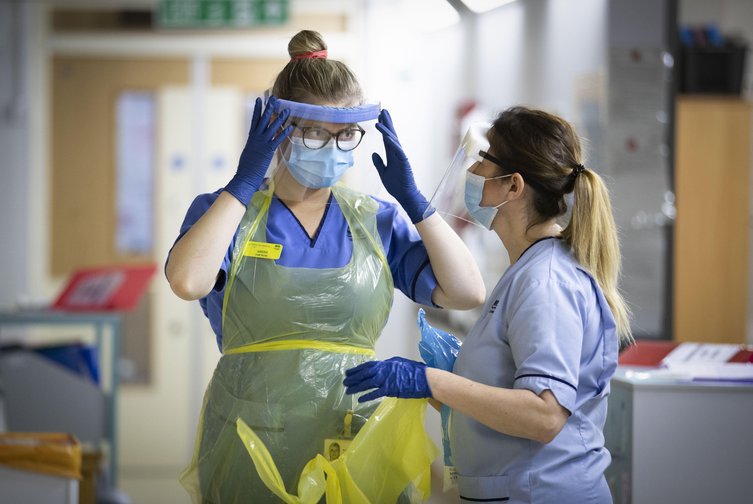Nearly 60% of the PPE procured from firms linked to the UK government was unusable – sparking fresh questions about controversial ‘VIP’ lane
Adam Bychawski
17 February 2022

£3.3bn of PPE was unsuitable for use in the NHS or defective. |
PA Images / Alamy Stock Photo
PPE supplied through the government’s controversial ‘VIP’ lane was three times more likely to be useless to the NHS than normally procured PPE, analysis by openDemocracy has revealed.
The government spent £1.7bn on masks, gowns and other items of PPE from 50 companies referred through its ‘VIP’ lane, meaning they were awarded contracts after being recommended by MPs, ministers, peers or health officials. More than half of this (59%) – supplied by 25 of the firms – was never used, equivalent to £1bn wasted.
In comparison, the proportion of unfit PPE supplied by non-VIP companies was significantly lower. Of the £10.4bn spent on PPE from suppliers that did not come through the VIP channel, £1.8bn (17%) has been unused.
In total, £2.8bn was spent on 1.9 billion items of unused PPE, according to figures from the Department of Health and Social Care (DHSC) that were obtained by Spotlight on Corruption through a Freedom of Information request. The department did not explain why the PPE was unused by the NHS, but said not all of it was defective.
Among the 127 companies on the department’s overall list of PPE suppliers is Meller Designs, which the DHSC revealed in November was processed through the VIP lane after being referred as a potential PPE supplier by Michael Gove’s office.
The company was at the time co-owned by David Meller, who has donated more than £63,000 to the Conservative Party since 2009 – including £3,250 to support Gove’s party leadership bid in 2016, a campaign on which Meller worked as chair of finance. Some 552,100 items, costing £8.5m, supplied by the firm were unused.
Also on the list is PPE MedPro, which supplied more than 25.5 million items, worth £124.6m, that were not used. The company was referred to the VIP lane by Baroness Mone, a Conservative peer, just weeks after it was set up. Last month, The Guardian reported that leaked documents appear to suggest that Mone and her husband, Douglas Barrowman, were secretly involved in the business.
Lawyers for Mone said she had no “association” with the company or the process by which it was awarded its PPE contract, while Barrowman’s lawyers said he “never had any role or function in PPE Medpro”
George Havenhand, a senior legal researcher at Spotlight on Corruption, said that the millions wasted on unused PPE from VIP lane companies was “an extraordinary indictment of government decision-making and due diligence”.
“It is essential that the government is fully transparent about what went wrong and what steps it has taken to recoup its losses, and that lessons are learned for the government’s new procurement framework,” he added.
The government broke the law with its VIP procurement process, the high court ruled last month, following a challenge by the Good Law Project and Every Doctor.
Justice O’Farrell found that two companies – PestFix and Ayanda – were unlawfully awarded PPE contracts through the VIP process. Together they supplied £225m worth of PPE that was unused, according to figures from DHSC. It is not known how much PPE they supplied that was used, if any.
In a written judgement, O’Farrell said: “There is evidence that opportunities were treated as high priority even where there were no objectively justifiable grounds for expediting the offer.”
Today’s figures on wasted PPE pale in comparison to the losses the DHSC revealed in its 2020-21 annual report earlier this month.
The report showed that the department squandered almost £10bn of the £12.1bn it spent on PPE. This was due to purchasing defective, unsuitable or overpriced equipment as it scrambled to meet unprecedented demand at the start of the pandemic.
A DHSC spokesperson said: “At the height of the pandemic, there was a desperate need for PPE to protect health and social care staff and the government rightly took swift and decisive action to secure it.
“The purpose of the high-priority lane was to efficiently prioritise credible offers of PPE, and our efforts helped secure vital equipment to protect healthcare workers during the pandemic, with 97% of PPE we ordered being suitable for use.”
It is unclear how the department calculated this figure. According to the DHSC’s own annual report, of the £12.1bn the government spent on PPE, £3.3bn worth was unsuitable for use in the NHS or defective. A further £750m was surplus to requirements and £5.9bn was written off because the department overpaid or could not cancel unsuitable orders.
No comments:
Post a Comment